- Home
- Wilkie Collins
Classic Ghost Stories Page 8
Classic Ghost Stories Read online
Page 8
Lucy answered in one positive word: “No.”
Mr. John Zant was not easily discouraged. “Show me your doll, darling,” he said. “Sit on my knee.”
Lucy answered in two positive words—“I won’t.”
Her father approached the window to administer the necessary reproof. Mr. John Zant interfered in the cause of mercy with his best grace. He held up his hands in cordial entreaty. “Dear Mr. Rayburn! The fairies are sometimes shy; and this little fairy doesn’t take to strangers at first sight. Dear child! All in good time. And what stay do you make at St. Sallins? May we hope that our poor attractions will tempt you to prolong your visit?”
He put his flattering little question with an ease of manner which was rather too plainly assumed; and he looked at Mr. Rayburn with a watchfulness which appeared to attach undue importance to the reply. When he said: “What stay do you make at St. Sallins?” did he really mean: “How soon do you leave us?” Inclining to adopt this conclusion, Mr. Rayburn answered cautiously, that his stay at the seaside would depend on circumstances. Mr. John Zant looked at his sister-in-law, sitting silent in a corner with Lucy on her lap. “Exert your attractions,” he said; “make the circumstances agreeable to our good friend. Will you dine with us to-day, my dear sir, and bring your little fairy with you?”
Lucy was far from receiving this complimentary allusion in the spirit in which it had been offered. “I’m not a fairy,” she declared. “I’m a child.”
“And a naughty child,” her father added, with all the severity that he could assume.
“I can’t help it, papa; the man with the big beard puts me out.”
The man with the big beard was amused—amiably, paternally amused—by Lucy’s plain speaking. He repeated his invitation to dinner; and he did his best to look disappointed when Mr. Rayburn made the necessary excuses.
“Another day,” he said (without, however, fixing the day). “I think you will find my house comfortable. My housekeeper may perhaps be eccentric—but in all essentials a woman in a thousand. Do you feel the change from London already? Our air at St. Sallins is really worthy of its reputation. Invalids who come here are cured as if by magic. What do you think of Mrs. Zant? How does she look?”
Mr. Rayburn was evidently expected to say that she looked better. He said it. Mr. John Zant seemed to have anticipated a stronger expression of opinion.
“Surprisingly better!” he pronounced. “Infinitely better! We ought both to be grateful. Pray believe that we are grateful.”
“If you mean grateful to me,” Mr. Rayburn remarked, “I don’t quite understand——”
“You don’t quite understand? Is it possible that you have forgotten our conversation when I first had the honour of receiving you? Look at Mrs. Zant again.”
Mr. Rayburn looked; and Mrs. Zant’s brother-in-law explained himself.
“You notice the return of her colour, the healthy brightness of her eyes. (No, my dear, I am not paying you idle compliments; I am stating plain facts.) For that happy result, Mr. Rayburn, we are indebted to you.”
“Surely not?”
“Surely yes! It was at your valuable suggestion that I thought of inviting my sister-in-law to visit me at St. Sallins. Ah, you remember it now. Forgive me if I look at my watch; the dinner hour is on my mind. Not, as your dear little daughter there seems to think, because I am greedy, but because I am always punctual, in justice to the cook. Shall we see you to-morrow? Call early, and you will find us at home.”
He gave Mrs. Zant his arm, and bowed and smiled, and kissed his hand to Lucy, and left the room. Recalling their interview at the hotel in London, Mr. Rayburn now understood John Zant’s object (on that occasion) in assuming the character of a helpless man in need of a sensible suggestion. If Mrs. Zant’s residence under his roof became associated with evil consequences, he could declare that she would never have entered the house but for Mr. Rayburn’s advice.
With the next day came the hateful necessity of returning this man’s visit.
Mr. Rayburn was placed between two alternatives. In Mrs. Zant’s interests he must remain, no matter at what sacrifice of his own inclinations, on good terms with her brother-in-law—or he must return to London, and leave the poor woman to her fate. His choice, it is needless to say, was never a matter of doubt. He called at the house, and did his innocent best—without in the least deceiving Mr. John Zant—to make himself agreeable during the short duration of his visit. Descending the stairs on his way out, accompanied by Mrs. Zant, he was surprised to see a middle-aged woman in the hall, who looked as if she was waiting there expressly to attract notice.
“The housekeeper,” Mrs. Zant whispered. “She is impudent enough to try to make acquaintance with you.”
This was exactly what the housekeeper was waiting in the hall to do.
“I hope you like our watering-place, sir,” she began. “If I can be of service to you, pray command me. Any friend of this lady’s has a claim on me—and you are an old friend, no doubt. I am only the housekeeper; but I presume to take a sincere interest in Mrs. Zant; and I am indeed glad to see you here. We none of us know—do we?—how soon we may want a friend. No offence, I hope? Thank you, sir. Good morning.”
There was nothing in the woman’s eyes which indicated an unsettled mind; nothing in the appearance of her lips which suggested habits of intoxication. That her strange outburst of familiarity proceeded from some strong motive seemed to be more than probable. Putting together what Mrs. Zant had already told him, and what he had himself observed, Mr. Rayburn suspected that the motive might be found in the housekeeper’s jealousy of her master.
11
Reflecting in the solitude of his own room, Mr. Rayburn felt that the one prudent course to take would be to persuade Mrs. Zant to leave St. Sallins. He tried to prepare her for this strong proceeding, when she came the next day to take Lucy out for a walk.
“If you still regret having forced yourself to accept your brother-in-law’s invitation,” was all he ventured to say, “don’t forget that you are perfect mistress of your own actions. You have only to come to me at the hotel, and I will take you back to London by the next train.”
She positively refused to entertain the idea.
“I should be a thankless creature indeed,” she said, “if I accepted your proposal. Do you think I am ungrateful enough to involve you in a personal quarrel with John Zant? No! If I find myself forced to leave the house, I will go away alone.”
There was no moving her from this resolution. When she and Lucy had gone out together, Mr. Rayburn remained at the hotel, with a mind ill at ease. A man of readier mental resources might have felt at a loss how to act for the best, in the emergency that now confronted him. While he was still as far as ever from arriving at a decision, some person knocked at the door.
Had Mrs. Zant returned? He looked up as the door was opened, and saw to his astonishment—Mr. John Zant’s housekeeper.
“Don’t let me alarm you, sir,” the woman said. “Mrs. Zant has been taken a little faint, at the door of our house. My master is attending to her.”
“Where is the child?” Mr. Rayburn asked.
“I was bringing her back to you, sir, when we met a lady and her little girl at the door of the hotel. They were on their way to the beach—and Miss Lucy begged hard to be allowed to go with them. The lady said the two children were playfellows, and she was sure you would not object.”
“The lady is quite right. Mrs. Zant’s illness is not serious, I hope?”
“I think not, sir. But I should like to say something in her interests. May I? Thank you.” She advanced a step nearer to him, and spoke her next words in a whisper. “Take Mrs. Zant away from this place, and lose no time in doing it.”
Mr. Rayburn was on his guard. He merely asked:
“Who?”
The housekeeper answered in a curiously indirect manner—partly in jest, as it seemed, and partly in earnest.
“When a man has lost his wife,” sh
e said, “there’s some difference of opinion in Parliament, as I hear, whether he does right or wrong, if he marries his wife’s sister. Wait a bit! I’m coming to the point. My master is one who has a long head on his shoulders; he sees consequences which escape the notice of people like me. In his way of thinking, if one man may marry his wife’s sister, and no harm done, where’s the objection if another man pays a compliment to the family, and marries his brother’s widow? My master, if you please, is that other man. Take the widow away before she marries him.”
This was beyond endurance.
“You insult Mrs. Zant,” Mr. Rayburn answered, “if you suppose that such a thing is possible!”
“Oh! I insult her, do I? Listen to me. One of three things will happen. She will be entrapped into consenting to it—or frightened into consenting to it—or drugged into consenting to it—”
Mr. Rayburn was too indignant to let her go on.
“You are talking nonsense,” he said. “There can be no marriage; the law forbids it”
“Are you one of the people who see no farther than their noses?” she asked insolently. “Won’t the law take his money? Is he obliged to mention that he is related to her by marriage, when he buys the licence?” She paused; her humour changed; she stamped furiously on the floor. The true motive that animated her showed itself in her next words, and warned Mr. Rayburn to grant a more favourable hearing than he had accorded to her yet. “If you won’t stop it,” she burst out, “I will! If he marries anybody, he is bound to marry ME. Will you take her away? I ask you, for the last time—will you take her away?”
The tone in which she made that final appeal to him had its effect.
“I will go back with you to John Zant’s house,” he said, “and judge for myself”
She laid her hand on his arm:
“I must go first—or you may not be let in. Follow me in five minutes; and don’t knock at the street door.”
On the point of leaving him, she abruptly returned.
“We have forgotten something,” she said. “Suppose my master refuses to see you. His temper might get the better of him; he might make it so unpleasant for you that you would be obliged to go.”
“My temper might get the better of me,” Mr. Rayburn replied; “and—if I thought it was in Mrs. Zant’s interests—I might refuse to leave the house unless she accompanied me.”
“That will never do, sir.”
“Why not?”
“Because I should be the person to suffer.”
“In what way?”
“In this way. If you picked a quarrel with my master, I should be blamed for it because I showed you upstairs. Besides, think of the lady. You might frighten her out of her senses, if it came to a struggle between you two men.”
The language was exaggerated; but there was a force in this last objection which Mr. Rayburn was obliged to acknowledge.
“And, after all,” the housekeeper continued, “he has more right over her than you have. He is related to her, and you are only her friend.”
Mr. Rayburn declined to let himself be influenced by this consideration.
“Mr. John Zant is only related to her by marriage,” he said. “If she prefers trusting in me—come what may of it, I will be worthy of her confidence.”
The housekeeper shook her head.
“That only means another quarrel,” she answered. “The wise way, with a man like my master, is the peaceable way. We must manage to deceive him.”
“I don’t like deceit.”
“In that case, sir, I’ll wish you good-bye. We will leave Mrs. Zant to do the best she can for herself.”
Mr. Rayburn was unreasonable. He positively refused to adopt this alternative.
“Will you hear what I have got to say?” the housekeeper asked.
“There can be no harm in that,” he admitted. “Go on.”
She took him at his word.
“When you called at our house,” she began, “did you notice the doors in the passage, on the first floor? Very well. One of them is the door of the drawing-room, and the other is the door of the library. Do you remember the drawing-room, sir?”
“I thought it a large well-lit room,” Mr. Rayburn answered. “And I noticed a doorway in the wall, with a handsome curtain hanging over it.”
“That’s enough for our purpose,” the housekeeper resumed. “On the other side of the curtain, if you had looked in, you would have found the library. Suppose my master is as polite as usual, and begs to be excused for not receiving you, because it is an inconvenient time. And suppose you are polite on your side, and take yourself off by the drawing-room door. You will find me waiting downstairs, on the first landing. Do you see it now?”
“I can’t say I do.”
“You surprise me, sir. What is to prevent us from getting back softly into the library, by the door in the passage? And why shouldn’t we use that second way into the library as a means of discovering what may be going on in the drawing-room? Safe behind the curtain, you will see him if he behaves uncivilly to Mrs. Zant, or you will hear her if she calls for help. In either case, you may be as rough and ready with my master as you find needful; it will be he who has frightened her, and not you. And who can blame the poor housekeeper because Mr. Rayburn did his duty, and protected a helpless woman? There is my plan, sir. Is it worth trying?”
He answered, sharply enough: “I don’t like it.”
The housekeeper opened the door again, and wished him good-bye.
If Mr. Rayburn had felt no more than an ordinary interest in Mrs. Zant, he would have let the woman go. As it was, he stopped her; and, after some further protest (which proved to be useless), he ended in giving way.
“You promise to follow my directions?” she stipulated.
He gave the promise. She smiled, nodded, and left him. True to his instructions, Mr. Rayburn reckoned five minutes by his watch, before he followed her.
12
The housekeeper was waiting for him, with the street-door ajar.
“They are both in the drawing-room,” she whispered, leading the way upstairs. “Step softly, and take him by surprise.”
A table of oblong shape stood midway between the drawing-room walls. At the end of it which was nearest to the window, Mrs. Zant was pacing to and fro across the breadth of the room. At the opposite end of the table, John Zant was seated. Taken completely by surprise, he showed himself in his true character. He started to his feet, and protested with an oath against the intrusion which had been committed on him.
Heedless of his action and his language, Mr. Rayburn could look at nothing; could think of nothing, but Mrs. Zant. She was still walking slowly to and fro, unconscious of the words of sympathy which he addressed to her, insensible even as it seemed to the presence of other persons in the room.
John Zant’s voice broke the silence. His temper was under control again: he had his reasons for still remaining on friendly terms with Mr. Rayburn.
“I am sorry I forgot myself just now,” he said.
Mr. Rayburn’s interest was concentrated on Mrs. Zant: he took no notice of the apology.
“When did this happen?” he asked.
“About a quarter of an hour ago. I was fortunately at home. Without speaking to me, without noticing me, she walked upstairs like a person in a dream.”
Mr. Rayburn suddenly pointed to Mrs. Zant.
“Look at her!” he said. “There’s a change!”
All restlessness in her movements had come to an end. She was standing at the farther end of the table which was nearest to the window, in the full flow of sunlight pouring at that moment over her face. Her eyes looked out straight before her—void of all expression. Her lips were a little parted; her head drooped slightly towards her shoulder, in an attitude which suggested listening for something or waiting for something. In the warm brilliant light, she stood before the two men, a living creature self-isolated in a stillness like the stillness of death.
John Zant was read
y with the expression of his opinion.
“A nervous seizure,” he said. “Something resembling catalepsy, as you see.”
“Have you sent for a doctor?”
“A doctor is not wanted.”
“I beg your pardon. It seems to me that medical help is absolutely necessary”
“Be so good as to remember,” Mr. John Zant answered, “that the decision rests with me, as the lady’s relative. I am sensible of the honour which your visit confers on me. But the time has been unhappily chosen. Forgive me if I suggest that you will do well to retire.”
Mr. Rayburn had not forgotten the housekeeper’s advice, or the promise which she had exacted from him. But the expression in John Zant’s face was a serious trial to his self-control. He hesitated, and looked back at Mrs. Zant.
If he provoked a quarrel by remaining in the room, the one alternative would be the removal of her by force. Fear of the consequences to herself, if she was suddenly and roughly roused from her trance, was the one consideration which reconciled him to submission. He withdrew.
The housekeeper was waiting for him below, on the first landing. When the door of the drawing-room had been closed again, she signed to him to follow her, and returned up the stairs. After another struggle with himself, he obeyed. They entered the library from the corridor—and placed themselves behind the closed curtain which hung over the doorway. It was easy so to arrange the edge of the drapery as to observe, without exciting suspicion, whatever was going on in the next room.
Mrs. Zant’s brother-in-law was approaching her, at the time when Mr. Rayburn saw him again.
In the instant afterwards, she moved—before he had completely passed over the space between them. Her still figure began to tremble. She lifted her drooping head. For a moment, there was a shrinking in her—as if she had been touched by something. She seemed to recognise the touch: she was still again.
John Zant watched the change. It suggested to him that she was beginning to recover her senses. He tried the experiment of speaking to her.
“My love, my sweet angel, come to the heart that adores you!”

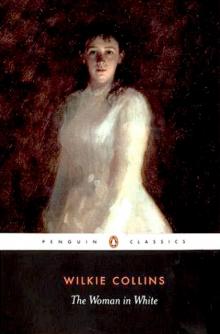 The Woman in White
The Woman in White The Queen of Hearts
The Queen of Hearts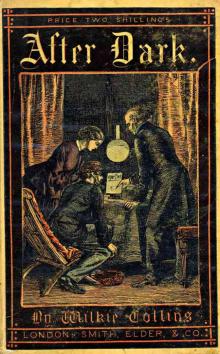 Miss Jeromette and the Clergyman
Miss Jeromette and the Clergyman Man and Wife
Man and Wife The Legacy of Cain
The Legacy of Cain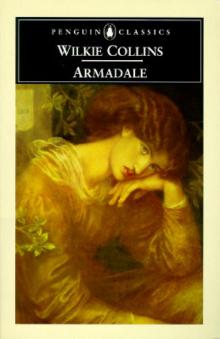 Armadale
Armadale The Frozen Deep
The Frozen Deep John Jago's Ghost or the Dead Alive
John Jago's Ghost or the Dead Alive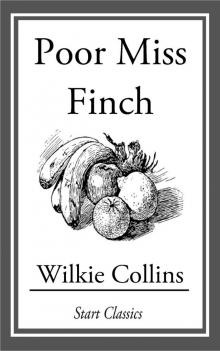 Poor Miss Finch
Poor Miss Finch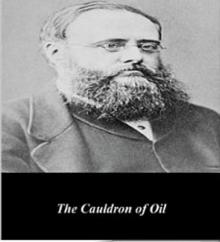 The Cauldron of Oil: A Case Worth Looking At
The Cauldron of Oil: A Case Worth Looking At The Poisoned Meal
The Poisoned Meal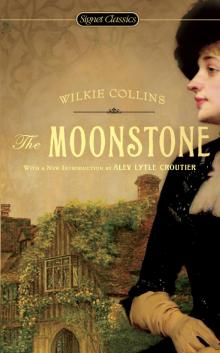 The Moonstone
The Moonstone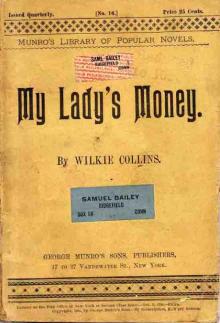 My Lady's Money
My Lady's Money Classic Ghost Stories
Classic Ghost Stories Jezebel's Daughter
Jezebel's Daughter The Devil's Spectacles
The Devil's Spectacles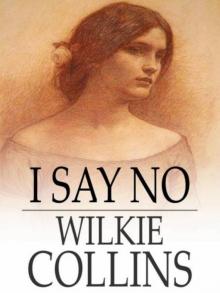 I Say No
I Say No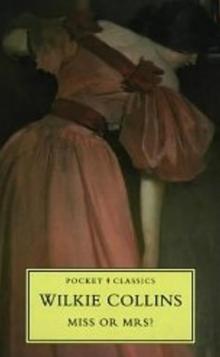 Miss or Mrs.?
Miss or Mrs.?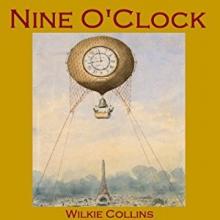 Nine O'Clock
Nine O'Clock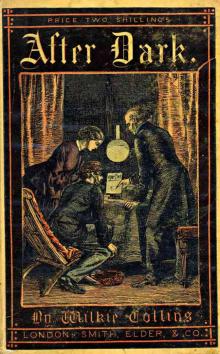 The Lawyer's Story of a Stolen Letter
The Lawyer's Story of a Stolen Letter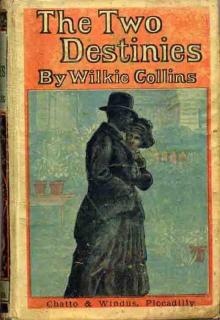 The Two Destinies
The Two Destinies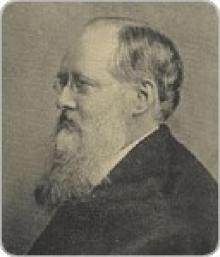 Mr. Percy and the Prophet
Mr. Percy and the Prophet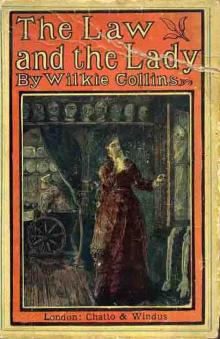 The Law and the Lady
The Law and the Lady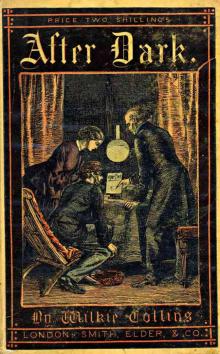 The Nun's Story of Gabriel's Marriage
The Nun's Story of Gabriel's Marriage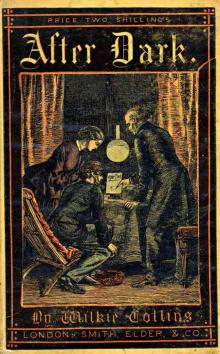 After Dark
After Dark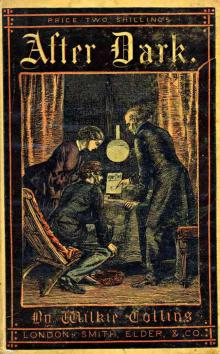 Mr. Captain and the Nymph
Mr. Captain and the Nymph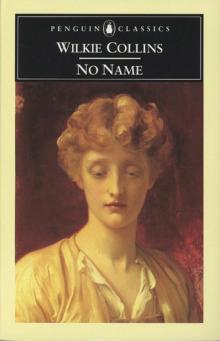 No Name
No Name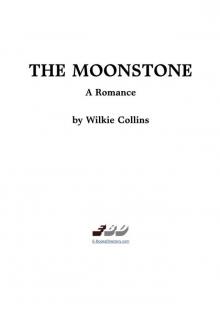 The Moonstone (Penguin Classics)
The Moonstone (Penguin Classics) Antonina
Antonina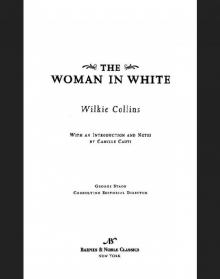 Woman in White (Barnes & Noble Classics Series)
Woman in White (Barnes & Noble Classics Series)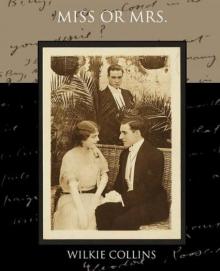 Miss or Mrs
Miss or Mrs The Dead Alive
The Dead Alive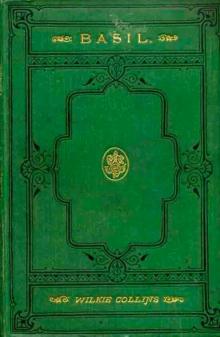 Basil
Basil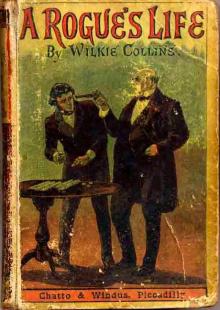 A Rogue's Life
A Rogue's Life The New Magdalen
The New Magdalen Blind Love
Blind Love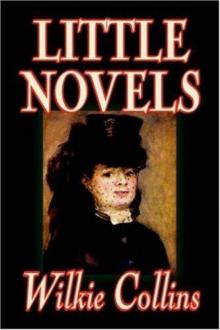 Little Novels
Little Novels The Lazy Tour of Two Idle Apprentices
The Lazy Tour of Two Idle Apprentices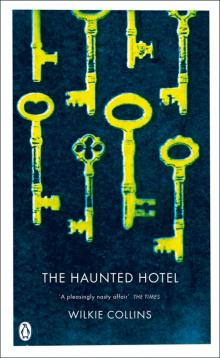 The Haunted Hotel
The Haunted Hotel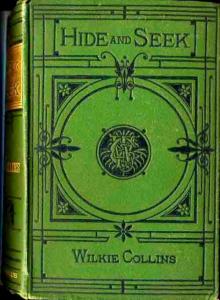 Hide and Seek
Hide and Seek